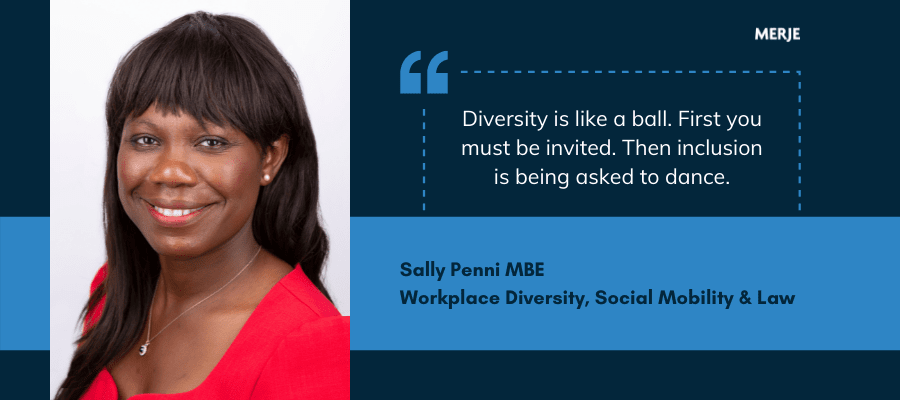In our latest MERJE Meets, we had the pleasure of chatting to award-winning barrister Sally Penni MBE.
Sally is a Fellow of the Royal Society of Arts and Manufacturing (RSA), a Companion of the Chartered Management Institute and is one of Cranfield University’s School of Management’s100 Women to Watch.
She is the founder of Women in the Law UKand host of the Talking Law podcast, which attracts more than 45,000 listeners and downloads. She is also the author of five books, including Rosie and the Unicorn, which she co-wrote with her daughter during lockdown to inspire hope and unity.
Here, Sally shares her thoughts around diversity and inclusion (D&I) in the workplace and what the future holds.
Given how important D&I is in the workplace and the increased international focus on equality we’ve seen over the last year, please share with us what it means to you and why you think it’s important?
Now, more than ever, diversity needs to be embedded into the culture of the workplace. The death of George Floyd has thrust the issue into the mainstream. Moreover, as we all build back after Covid-19, it is an opportunity to build back better than ever before.
It is time to look at the workplace and assess and evaluate what has worked and what can work better. The progress on BAME individuals in senior leadership positions is woefully slow.
Both a report by McKinsey Global Institute and the Parker Review tell us that diverse organisations are more profitable, and yet diversity in certain sectors is lacking. The law is an example of this.
For me it really means creating not only a diverse workplace but an inclusive one. One in which people can thrive regardless of gender, race or social background.
How would you advocate for diversity, equality and inclusion with colleagues and organisations who don’t understand its importance?
This is a big question that many companies are wondering about. The important thing is to encourage allies.
Often, colleagues don’t know what to say and how to say it and I am asked this question a lot.
My first point is to start with having an open conversation. These are difficult and often uncomfortable conversations to have.
Our relationship with race, for example, is a difficult one. To move on, we need to ask employees, “How do you feel in the workplace? What can we do to make it better? Do you feel included?”
I prefer ‘deeds not words’, to quote Manchester suffragette Emmeline Pankhurst. Organisations and colleagues need to do more than simply have meaningless policies in place.
They need to consider true implementation and inclusion. This may well include looking at recruitment from under-represented groups.
Organisations can also review their practices surrounding promotion, look at mentors and sponsors from those groups and identify role models and senior leadership in the organisation to see if this is mirrored below at other levels.
I believe we should strive to create a culture where people can bring their whole selves to work. Diversity is like a ball. First you must be invited. Then inclusion is to be asked to dance.
In a post Brexit and post covid recovering economy which is trying to build back and build back a better economy, we need everyone in the workforce in order to recover.
What do you envisage as being the next big focus in the D&I sphere?
I believe that neurodiversity will, and quite rightly should, be the next big focus for inclusivity. Unlike mental health conditions, which can come and go throughout an individual’s life, neurodiverse conditions are developmental. This means that they are present from birth and, while in some cases affected individuals can learn to manage their effects, they do not go away and cannot be “cured”.
The following are neurodiverse conditions:
ADHD
Autism
Dyslexia
Dyspraxia
Dyscalculia
Dysgraphia
Tourette Syndrome
Most workplaces are likely to have neurodiverse people working in them, although they might not have been diagnosed. Diagnosis is particularly patchy among older age groups – especially those with milder forms of their conditions – and also among women, girls and black people.
From a legal perspective, neurodiverse conditions meet the definition of disability as set out in the Equality Act. This means that making reasonable adjustments to accommodate the needs of workers who have been diagnosed with one or more neurodiverse conditions is a legal, as well as ethical, requirement.
Neurodiverse conditions can vary in severity but will, in many cases, require some kind of adaptation in the workplace. The good news is that the kind of adaptations to hiring and working practices that can help neurodivergent individuals can also in many cases benefit the whole workforce. A study published in the Harvard Business Review in 2019 found that inclusive workplaces had lower staff absence and improved performance across the board.
Neurodiverse employees are 30% to 50% more productive than neurotypical people, according to Harvard Business Review, 2019 and JP Morgan. This is partly due to the ability of neurodiverse people to learn very rapidly. Their high productivity is also down to neurodiverse people being unusually creative and insightful. They are also quick to spot patterns, come up with myriad ideas and they have incredible problem-solving skills.
Bearing this in mind, I feel strongly that now is the time to welcome neurodiverse people on board. Neurodiverse individuals have an immense array of strengths, along with their challenges. Accessibility is important, but inclusion goes further than that.
Being accessible is opening the door, which means removing the barriers that prevent neurodiverse people from working or interacting with you. Inclusion means inviting them in, giving them a seat at the table and listening to their voices.
To conclude, the benefits of being inclusive towards neurodiverse people extend far beyond bringing in an individual who may be creative, insightful and, often, more productive than average. Inclusion brings better collaboration, improved perceptions of the company and increased revenue.
Ultimately, being inclusive to neurodiverse people allows your entire workplace to thrive and paves the way for future success.
To talk about your diversity and inclusion requirements in more detail, please contact us.



